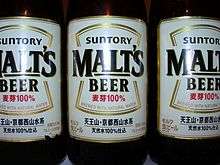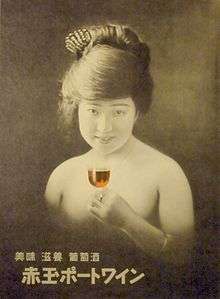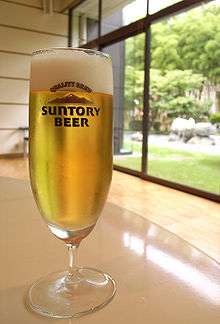Suntory
Suntory Beverage & Food Limited (サントリーホールディングス株式会社, Santorī Hōrudingusu Kabushiki-Gaisha) (commonly referred to as simply Suntory) is a Japanese multinational brewing and distilling company group. Established in 1899, it is one of the oldest companies in the distribution of alcoholic beverages in Japan, and makes Japanese whisky. Its business has expanded to other fields, and the company now also makes soft drinks and operates sandwich chains. With its 2014 acquisition of Beam, Inc., it has diversified internationally and become one of the largest makers of distilled beverages in the world. Suntory is headquartered in Dojimahama 2-chome, Kita-ku, Osaka, Osaka Prefecture.
 Suntory headquarters, Osaka, Japan | |
| Kabushiki gaisha | |
| Traded as | TYO: 2587 |
| ISIN | JP3336560002 |
| Industry | Beverage |
| Founded | Osaka, Japan 1899 |
| Founder | Torii Shinjiro |
| Headquarters | Osaka , Japan |
Key people | Saburo Kogo (Chairman) Kazuhiro Saito (President and CEO) |
| Subsidiaries | Beam Suntory |
| Website | suntory |
History
Suntory was started by Shinjirō Torii (鳥井 信治郎, Torii Shinjirō), who first opened his store Torii Shōten (鳥井商店) in Osaka on February 1, 1899, to sell imported wines. In 1907, the store began selling a fortified wine called Akadama Port Wine. The store became the Kotobukiya company in 1921 to further expand its business and in 1923, Torii built Japan's first malt whisky distillery Yamazaki Distillery. Production began in December 1924 and five years later Suntory Whisky Shirofuda (White Label), the first single malt whisky made in Japan, was sold.
Due to shortages during World War II, Kotobukiya was forced to halt its development of new products, but in 1946 it re-released Torys Whisky, which sold well in post-war Japan. In 1961, Kotobukiya launched the "Drink Torys and Go to Hawaii" campaign. At the time, a trip abroad was considered a once-in-a-lifetime opportunity. In 1963, Kotobukiya changed its name to "Suntory", taken from the name of the whisky it produces. In the same year, Musashino Beer Factory began its production of the Suntory Beer. In 1997, the company became Japan's sole bottler, distributor, and licensee of Pepsi products.
On April 1, 2009, Suntory became a stockholding company named Suntory Holdings Limited (サントリーホールディングス株式会社) and established Suntory Beverage and Food Limited (サントリー食品株式会社), Suntory Products Limited (サントリープロダクツ株式会社), Suntory Wellness Limited (サントリーウェルネス株式会社), Suntory Liquors Limited (サントリー酒類株式会社), Suntory Beer & Spirits Limited (サントリービア&スピリッツ株式会社), Suntory Wine International Limited (サントリーワインインターナショナル株式会社), and Suntory Business Expert Limited (サントリービジネスエキスパート株式会社).[1]
On July 14, 2009, Kirin announced that it was negotiating with Suntory on a merger.[2] On February 8, 2010, it was announced that negotiations between the two were terminated.[3]
In 2009 Suntory acquired Orangina, the orange soft drink for 300 billion yen, and Frucor energy drinks for 600 million euros.[4] On 2 July 2013 the company debuted on the Tokyo stock exchange and raised almost US$4 billion in the process.[5]
In September 2013, Suntory purchased the drinks division of GlaxoSmithKline. This included the brands Lucozade and Ribena, however, the deal did not include Horlicks.[6]
In January 2014, Suntory announced an agreement to buy the largest U.S. bourbon producer, Beam Inc. (producers of Jim Beam) for US$16 billion.[7] This deal would make Suntory the world's third largest spirits maker.[8] The acquisition was completed in April 2014, when it was announced that Beam would be renamed Beam Suntory.[9][10]
Holdings

- Beam Suntory
- Cerebos Pacific Limited
- Château Lagrange S.A.S
- Florigene Pty Ltd
- Frucor Beverages Limited
- Gold Knoll Ltd
- Grupo Restaurante Suntory Mexico
- Louis Royer S.A.S
- Morrison Bowmore Distillers, Limited
- Orangina[11]
- Pepsi Bottling Ventures LLC
- Subway Japan
- Tipco F&B Co., Ltd
- Suntory PepsiCo Vietnam Beverage Co., Ltd (joint-venture with PepsiCo)
Joint ventures
From the early 1990s, Suntory has collaborated extensively with Melbourne biotechnology firm Florigene to genetically engineer the world's first true blue rose, a symbol often associated with the impossible or unattainable. In 1991, the team won the intense global race to isolate the gene responsible for blue flowers, and has since developed a range of genetically modified flowers expressing colors in the blue spectrum, as well as a number of other breakthroughs extending the vase life of cut flowers.
In 2003, Suntory acquired a 98.5% equity holding in Florigene. Prior to this, Florigene had been a subsidiary of global agrochemicals giant Nufarm since 1999. In July 2004, Suntory and Florigene scientists announced to the world the development of the first roses containing blue pigment, an important step toward the creation of a truly blue colored rose.
In July 2011, Suntory Beverage and Food Limited together with PT GarudaFood from Tudung Group in Indonesia have agreed to make a new firm to produce non-alcoholic drink with 51 percent and 49 percent shares respectively. It will produce Suntory Oolong Tea, Boss and Orangina.[12]
In April 2019 Suntory partnered with Drinkripples, an Israeli-based company. As part of the collaboration Suntory will use Drinkripples' Ripple Maker machines to print branded and viral content on top of Suntory beer in Suntory certified locations and factories throughout Japan.[13]
Media and advertising

- Suntory and its various products are featured in the Ryū ga Gotoku/Yakuza series of games.
- Suntory was one of the first East Asian companies to specifically employ American celebrities to market their product. One of the most notable is Sammy Davis, Jr., who appeared in a series of Suntory commercials in the early 1970s. In the late 1970s, Akira Kurosawa directed a series of commercials featuring American celebrities on the set of his film Kagemusha. One of these featured Francis Ford Coppola (an executive producer of the film), which later inspired his daughter Sofia Coppola in her writing of Lost in Translation, a film which focuses on an American actor (played by Bill Murray) filming a Suntory commercial in Tokyo.
- A Reuters photo by Toshiyuki Aizawa from July 2003 showed Suntory's marketing strategy of TV helmets. In this scheme, advertising company employees clad in orange jumpsuits wear television cameras that broadcast wide-screen digital feeds of the brewing company's commercial on top of their helmets.
- Suntory operates two museums, the Suntory Museum of Art in Tokyo and the Suntory Museum Tempozan in Osaka, in addition to a number of cultural and social programs across Japan.
- Suntory produced several drinks under the name "Final Fantasy Potion", named for the weakest and most common healing item in the game. Each was released in Japan only for a limited time to promote the release of the Square Enix game Final Fantasy XII, the 10th anniversary of Final Fantasy VII, and the release of Dissidia Final Fantasy, which comes in two varieties. All the drinks are different despite sharing the name. For the release of Final Fantasy XIII, the Potion name was abandoned and replaced with Elixir, an item which typically heals one party member fully and restores all MP.
- Suntory owns a top Japanese rugby club called the Suntory Sungoliath.
- In the 1970s, Suntory engaged the US pop group the Carpenters to advertise its new line of soft drinks.
- Suntory is a former sponsor of the professional match play golf tournament, played annually at Wentworth Club, near London.
- In the 2000s, to advertise its The Premium Malt beer, there were a series of television ads featuring Eikichi Yazawa and various versions of the title song of "Shall We Dance?".
- Suntory created their own virtual youtuber named Suntory Nomu (a Japanese pun meaning drink Suntory) who is the personification of Suntory and their product.
Products

Alcoholic drinks
|
|
|
Soft drinks
Food for specified health uses
The following drinks were approved as Food for Specified Health Uses (FOSHU).[14][15][16]
- Black Oolong Tea
- Sesame Barley Tea
See also
- Suntory Sungoliath rugby team – champions of the 2007-08 Top League (fifth season)
- Suntory Mermaid II – wave powered catamaran
References
- Suntory News Release on January 19, 2009 (Global website), (Japan website) Archived 2009-03-24 at the Wayback Machine - Suntory Limited
- キリン:サントリーと経営統合へ交渉 - 毎日jp(毎日新聞) Archived 2012-07-10 at Archive.today Mainichi Shimbun (Retrieved on July 13, 2009)
- Termination of Merger Negotiation with Kirin Archived 2010-03-01 at the Wayback Machine Suntory News Release (Retrieved on February 8, 2010)
- "Suntory buys Frucor from Groupe Danone October 2008". Danone. 23 October 2008. Retrieved 16 January 2009.
- Suntory IPO
- Angela Monaghan "Ribena and Lucozade sold to Japanese drinks giant", The Guardian, 9 September 2013
- Suntory News Release on January 13th, 2014 (Global website)
- MARTINNE GELLER AND OLIVIA ORAN (14 January 2014). "Japan's Suntory to buy U.S. spirits maker Beam for $13.6 billion cash". Reuters.
- Beam Suntory, Suntory press release, April 30, 2014.
- Suntory Still has M&A Thirst, The Wall Street Journal, May 15, 2014.
- "Japan's Suntory snaps up Orangina". BBC News. BBC. 2009-11-13. Retrieved 2009-11-15.
- "GarudaFood, Suntory form joint venture". The Jakarta Post. 2011-07-16. Retrieved 2012-10-14.
- "Ripples Suntory Partnership".
- "Food for Specified Health Uses (FOSHU)", Ministry of Health, Labour and Welfare (Retrieved on May 1, 2010)
- "Beverages, Health Beverages" Archived 2011-06-11 at the Wayback Machine, Suntory (Retrieved on May 1, 2010)
- "Soft drink product information" (in Japanese), Suntory (Retrieved on May 1, 2010)
External links
| Wikimedia Commons has media related to Suntory. |